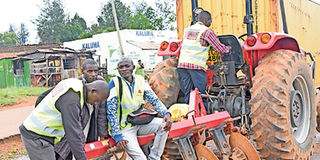Brief news on farming and agribusiness in the country

Experts train farmers on maintenance of their tractors during a recent FMD Tractors Clinic in Kakamega. FMD East Africa sales consultant Dean Alexander said there is huge influx of fake spare parts. PHOTO | ISAAC WALE | NMG
What you need to know:
- FMD East Africa sales consultant Dean Alexander said there is huge influx of fake spare parts.
- A study by Food and Agriculture Organisation indicates that the average aflatoxin levels in Meru stand at 46.6 ppb above the safe limit of 10 ppb.
- Nyeri county has proposed to make two key agricultural institutions semi-autonomous to boost revenues and set up a fund to support their activities.
- Agriculture executive Davis Mwangoma said the devolved unit will also empower more farmers to grow the lucrative crop.
Farmers benefit from free tractor clinics
Farmers in Kakamega and Mayoni in western benefited from free tractor services during a clinic held by FMD East Africa last week.
One after the other, the FMD technicians checked on the tractors and answered farmers’ questions. Kennedy Wasike, a farmer based in Bungoma, attended to find out the cause of constant leaks on his tractor.
He said the clinic was an eye-opener, helping farmers differentiate genuine spare parts from fake ones.
“We have been unknowingly replacing filters with fake ones from the local market. As a result, we have been experiencing the frequent leaks,” he said.
FMD East Africa sales consultant Dean Alexander said there is huge influx of fake spare parts.
He cautioned farmers against obtaining spare parts from unscrupulous shops.
“It is a huge problem considering that it is a free market and you cannot stop spare parts coming in the country. This fake spare parts end up kill the functioning of tractors,” said Alexander.
He added most farmers use adulterated fuel to run their tractors, which affects them.
During the event, the firm repaired over 30 tractors.
The Xtra Care Clinics are organised every month in different parts of the country.
-Elizabeth Ojina
****
County drafts aflatoxin management policy to fight the menace in cereals
Grain farmers, traders and transporters in Meru will be required to adhere to strict guidelines to prevent consumption of aflatoxin-infested products once a draft policy is approved.
The county government has started the process of developing the aflatoxin risk management policy, which aims to boost food safety.
The draft policy prepared by agriculture and health departments aims to increase awareness on aflatoxin risks, reduce contamination in human and animal food, support research and technology as well as enhance food safety monitoring.
Crops’ director Misheck Kaburu said aflatoxin affects cereals from planting to storage and transportation hence the need for multisectoral approach.
Mr Simon Rukwaro, a public health official, said there is high prevalence of aflatoxin in the region.
A study by Food and Agriculture Organisation indicates that the average aflatoxin levels in Meru stand at 46.6 ppb above the safe limit of 10 ppb.
-David Muchui
****
Scientists call for the protection of agro-forestry to beat climate change
Scientists have called for the protection of agroforestry to address climate change, food insecurity and land degradation.
Dr Peter Minang, a research scientist at the World Agroforestry Centre (ICRAF) told the over 1,200 delegates at the 4th World Congress on Agroforestry in Montpellier, France, this week that Africa is only going to achieve resilient climate-smart and sustainable development if farmers can build on agroforestry systems.
“Africa is endowed with massive traditional agroforestry systems, such as the one in Ethiopia, where coffee originated,” said Minag.
However, the expert noted that these agroforestry systems are facing massive challenges ranging from deforestation, pests and diseases, to use of pesticides and other chemicals that are killing pollinators.
In Kenya, agroforestry is practised in many different forms where in some areas farmers have scattered trees on their farms, others on the boundaries or live fences and hedges, while others use trees on their farms as wind breakers.
Saul Morris, the Director of Programme Services at the Global Alliance for Improved Nutrition (GAIN) emphasised on the importance of agroforestry in addressing food and nutrition security.
-Isaiah Esipisu
****
County proposes to make two top agricultural institutions independent
Nyeri county has proposed to make two key agricultural institutions semi-autonomous to boost revenues and set up a fund to support their activities.
The proposal is contained in the County Agricultural Institutions Fund Bill 2019, which is currently being reviewed by the assembly’s agriculture committee.
If passed into law, the bill will make Narumoru Agricultural Mechanisation Station and Wambugu Farm Agricultural Training Centre independent.
Wambugu Farm ATC holds annual farmers field days, which attract more than 15,000 participants.
For the fund, the county will set aside Sh20 million capital.
Through the fund, the executive hopes to improve the running of machineries at the Narumoru station.
Agriculture committee chairman Anthony Ndagita said his team would work on the bill before lobbying MCAs for support.
-Irene Mugo
****
County supplies macadamia seedlings
Taita Taveta county government will increase the acreage under macadamia from the current 270 to 1,000 to boost farmers’ income.
Agriculture executive Davis Mwangoma said the devolved unit will also empower more farmers to grow the lucrative crop.
The farmers got a huge boost after the county supplied them free seedlings.
Some 1,316 farmers from Wusi/Kishamba and Chawia wards received more than five macadamia seedlings each.
Governor Granton Samboja said his county government procured some 8,500 seedlings.
An acre can hold up to 40 trees, which produce 100kg each, guaranteeing a farmer Sh600,000 after the fifth year of planting.
The county government also urged more farmers to embrace macadamia farming.
Farmers asked the county government to market the produce, noting brokers were exploiting them.
-Winnie Atieno





